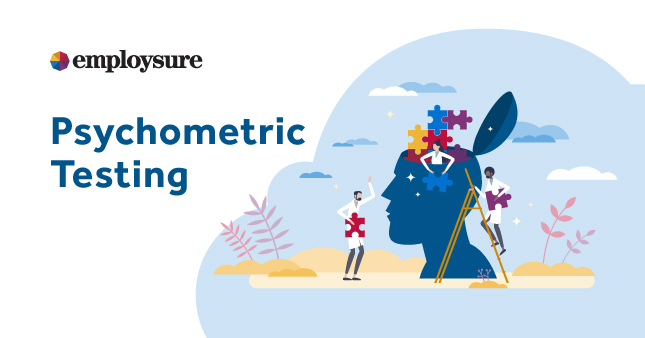
All recruiters would love to know whether or not a candidate can excel in a role before they hire them. Psychometric testing is designed to help human resources teams understand exactly this.
But what is psychometric testing, how does it work, and could it be the crystal ball that takes the guesswork out of your recruitment process?
What is psychometric testing?
Psychometric tests measure a prospective employee’s skills and attributes, helping human resources staff assess the possibilities for performance and optimising their recruitment strategy.
Some psychometric tests analyse cognitive abilities, focusing on verbal, numerical, and abstract reasoning skills. Others examine dominant personality traits, helping to determine if a candidate will be a good fit for a company’s culture. Tests normally have a time limit and consist of multiple-choice questions.
Traditionally recruiters have based the hiring process on resumes, qualifications, and interviews. While these methods remain useful, psychometric tests offer a deeper and more objective analysis of a candidate’s nature and key skills.
Types of psychometric tests
New and innovative forms of psychometric tests are constantly being developed. Currently, the most popular types of tests include:
Aptitude tests: These analyse a candidate’s ability to perform certain tasks and respond to common workplace scenarios. Often aptitude tests are tailored to roles and industries, such as assessing the visual reasoning skills of a graphic designer.
Personality tests: This type of test is designed to systematically uncover insights about a candidate’s motivations, preferences, interests, and emotional make-up. Personality questionaries help hiring managers assess how potential employees will behave and interact with teammates.
Situational judgement tests: The main purpose of a situational judgement test is to assess how a candidate will respond to hypothetical scenarios. A hospital might test for the ability to make the right decisions in a high-pressure situation.
Emotional intelligence tests: As well as intellectual intelligence, employers will often measure a candidate’s emotional intelligence (EI). Somebody with impressive emotional intelligence will demonstrate strong social skills, the ability to defuse conflict, and a sense of empathy toward colleagues.
Integrity tests: This is a specific type of personality test designed to assess a candidate’s likelihood to be honest, trustworthy, and dependable. A lack of integrity is linked with disciplinary issues and negative workplace conduct, such as theft, violence, sabotage, and absenteeism.
Numerical reasoning tests: These tests identify a candidate’s ability to deal with numbers and solve problems. Numerical reasoning tests often contain questions that assess knowledge of ratios, percentages, number sequences, and data analysis.
Benefits of psychometric testing
There are a range of benefits for businesses that use psychometric testing. These include:
✔ Better hiring decisions: With a variety of psychometric tests available, human resources can narrow down their candidate pool based on a combination of specific skills, personality traits and professional tendencies.
✔ Increased productivity: A natural knock-on effect of a recruitment process backed-up by psychometric testing is that new employees tend to be more productive. With the candidate already established as a good fit for their role, they are often able to hit the ground running.
✔ Improved retention rates: By accurately assessing if a candidate is well suited to a role, employers can improve their retention rates. Psychometric tests also help employers make well-informed decisions with promotions, further boosting retention rates.
✔ Enhanced diversity and inclusion: Psychometric tests have the potential to increase diversity and inclusion. For instance, personality profiling looks beyond cultural backgrounds and measures the fit of a candidate based on their character.

Take your onboarding to the next level
An efficient and effective onboarding process can set your new staff up for success and propel a business to greater heights. Make a great first impression and help your new employees start on the right foot with our free Onboarding Template.
Psychometric test types
By this stage, you may be wondering what goes into the different psychometric tests. Here is what you can expect with each test type:
Abstract type test: Used to measure your lateral thinking, abstract tests challenge candidates to identify and interpret the relationship between a collection of shapes and patterns.
Personality test: This involves selecting from a list of statements that best describe your individual tendencies. The questions in personality questionnaires are designed to understand your behaviour in detail.
Verbal type test: With verbal reasoning tests, candidates are asked to read a few paragraphs of written text and then answer questions that test their ability to interpret information and draw conclusions.
Numerical type test: With numerical tests, information is presented in the form of graphs, tables, and charts. Candidates are then asked to perform sums using the data (thankfully, calculators are usually allowed!).
Emotional intelligence type test: Candidates are asked to pick their most likely response to a hypothetical scenario. This psychometric test is designed to predict how you will deal with stressful or challenging situations.
How to use psychometric testing effectively
To maximise the benefits of psychometric tests, follow these six simple steps:
Understand the purpose of the test: Start by clearly defining the demands of the role. This will help you identify the skills and traits you should be testing for.
Choose the right test: With the requirements for the role established, next choose the psychometric tests that will help you effectively measure against your criteria.
Ensure proper administration: Pick a platform that is easy to use and offers practice tests. If the interface is tricky to navigate, you run the risk of confusing candidates and producing inaccurate results.
Use a qualified practitioner: When it comes to interpreting test results, the chances of misjudgement are high. Anyone tasked with assessing psychometric tests will need to be professionally trained.
Combine with other assessment methods: Psychometric tests do have limitations and are most effective when combined with other traditional recruitment methods, such as interviews and trial assignments.
Communicate results effectively: Recruitment decision-making processes normally involve multiple stakeholders. Make sure test results are clearly documented and shared with all relevant parties. Many online psychometric tests will generate detailed reports.
How to interpret test results
To interpret psychometric test results, you first need to review the test manual to understand the scoring method.
If you use an online test platform, ‘norm groups’ are supplied based on past results. Norm groups allow you to compare the candidate’s score to a benchmark set by others working in the same occupation.
Frequently Asked Questions
Which employers use psychometric tests?
With psychometric tests growing in popularity, employers in a wide range of industries are incorporating them into their recruitment process.
Industries that rely heavily on a technical skill set, such as healthcare and tech, often expect candidates to complete aptitude tests. Finance companies will often use numeracy tests, while civil services and the armed forces are likely to perform personality and situational judgement tests.
